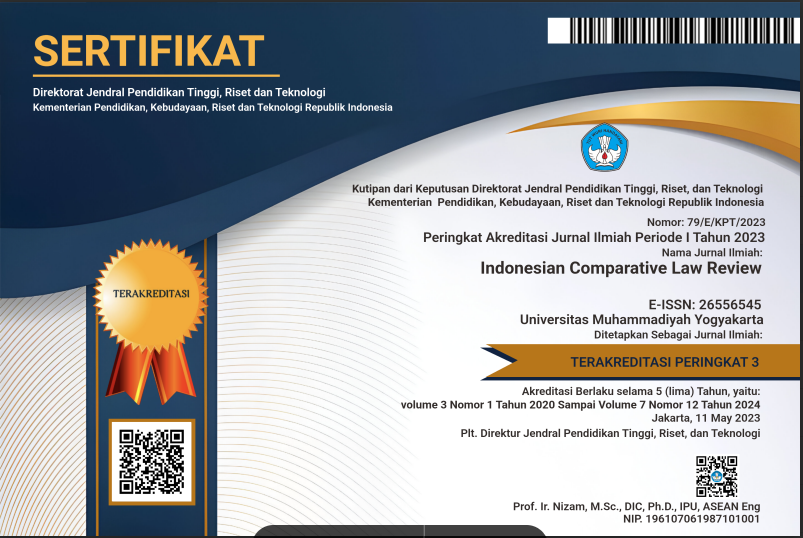The Doctrine of Informed Consent and Duty of Disclosure: A Comparative Essay between the US, UK, Australia and Malaysia with Indonesia
Abstract
The study aims to compare and contrast the position of four countries (The US, UK, Australia, and Malaysia) regarding informed consent, particularly on the subject of disclosure of information with Indonesia. Other than that, the legal issues to be studied were the implications brought upon the healthcare and judicial system in the respective countries as well as the advantages and disadvantages of each test propounded. It was found that previously the welfare of the patient in regards to their right to receive information (especially risks) regarding their medical treatment was only up to the discretion of the medical practitioner and other members of the medical profession, which eliminates liability against a negligent doctor if it was found that other members of the medical community would have done the same as him. It was not until the case of Rogers v Whitaker that the spectrum widened and allowed the courts to determine that whatever that should be disclosed to the patient must be something that the patient attaches significant risk to, this is then named the “Prudent Patient Test”, used by most countries in this study. The study finds that as an implication, most countries have departed from the previous paternalistic approach by doctors and as an advantage, encouraged individualism and the reduction of the patients as passive recipients in their own health care. Since most of the comparative countries are similar in application, it was found that the medical law envisioned and enforced in the respective countries was quite different compared to the civil legal system in Indonesia. Other than that, as a country that is highly ingrained with Islamic values of life, the perspective of human rights and individualism in Indonesia is distinct with most of the other countries studied.
Keywords
Full Text:
PDFReferences
CASES
Chatterton v Gerson [1981] 1 All ER 257
Salgo v. Leland Stanford Etc. Bd. Trustees, 154 Cal. App. 2d 560 (Cal. Ct. App. 1957)
Canterbury v. Spence, 464 F.2d 772 (D.C. Cir. 1972)
Sidaway v Board Governors of Bethlem etc [1985] AC 871
Montgomery v Lanarkshire Health Board [2015] UKSC 11
Rogers v Whitaker [1992] HCA 58; 175 CLR 479; 23 NSWLR 600; 109 ALR 625; (1991) Aust Torts Reports 81–113
Liew Sin Kiong v Dr Sharon M Paulraj [1996] 2 AMR 1403
Dato Dr. V. Thuraisingam v Sanmarkan A/L Ganapathy [2015] MLJU 733
Kamalam a/p & Ors v Eastern Plantation Agency & Anor [1996] 4 MLJ 674
Hong Chuan Lay v Dr Eddie Soo Fook Mun [1998] 5 CLJ 251
Foo Fio Na v Dr Soo Fook Mun & Anor [2007] 1 MLJ 593
LEGISLATION
Consent Guidelines of the Malaysian Medical Council (MMC) 2013
Indonesian Civil Code
Indonesian Penal Code
Law No. 36 of 2009 on Health, Government Regulation
Law No.32 of 1996 on Health Worker
Law No.29 of 2004 on Medical Practice
Law No. 8 of 1999 on Consumer Protection
Health Ministerial Decree No. 29 of 2008
Kode Etik Kedokteran Indonesia (KODEKI)
Medical Practice Act 2004
Kode Etik Rumah Sakit Indonesia (KODERSI)
JOURNALS
Yousuf, R M, A R M Fauzi, S H How, A G Rasool, and K Rehana. 2007. "Awareness, Knowledge And
Attitude Towards Informed Consent Among Doctors In Two Different Cultures In Asia: A
Cross-Sectional Comparative Study In Malaysia And Kashmir, India". Singapore Medical Journal 48 (6): 562.
Moein, Harustiati A. 2018. "Informed Consent In Indonesia". Journal Of Law, Policy And Globalization 69: 66.
Rathor, M Y, Mohammad Fauzi Abdul Rani, Azarisman Mohammad Shah, and Sheikh Fariuddin Akter. 2011. "Informed Consent: A Socio-Legal Study". Medical Journal Malaysia 66 (5).
Sugiarti, Ida. 2010. "Perbandingan Hukum Informed Consent Indonesia Dan Amerika Serikat". FH.UNISBA 12 (3): 252.
DOI: https://doi.org/10.18196/iclr.2113
Refbacks
- There are currently no refbacks.
Copyright (c) 2019 Alyssa Dalila Badli Esham

This work is licensed under a Creative Commons Attribution 4.0 International License. View My Stats


